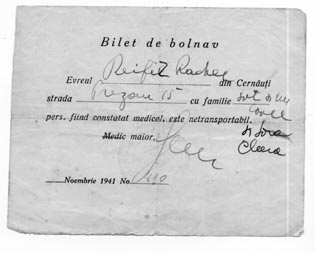
Translation of above:
Explanation:
My father, Salomon Reifer, kept a number of personal documents from the WW2 period, which in conjunction with my own personal memories are a testimony to the persecution of the Jews in the city of Cernauti during that period.
Romania entered WW2 on the side of Germany on June 21, 1941. During the following month many thousand Jews were murdered and many more were deported to Transnistria. The Romanian government passed many legislative measures aimed at depriving Jews of their property, business and employment. It established the "Centrul National de Romanizare" (National Center for Romanization), the aim of which was to confiscate Jewish property and Businesses and to hand them over to Romanians, as well as to have Jewish professional employees teach their profession to Romanians, who would then take over their jobs.
In October 1941 Corneliu Calotescu became governor of the Bucovina. He installed the the "Cabinetu Militar", the aim of which was to destroy the Jews of Bucovina. The Jewish ghetto was established on Oct. 11, 1941 and deportations to Transnistria followed starting on Oct.14. The mayor of Cernauti, Traian Popovici, attempted to prevent the deportation of part of the Jewish population by claiming they were needed for the economy of the city and issued permits to a large number of people. (document 1 below)
Document 1

Translation of above:
Town Hall of the municipitality of Cernauti
Declaration
The undersigned....
Jewish head of family, declares that he is a resident of Cernauti,
street...
and before the establishment of the ghetto resident at.....
am .... years old. My profession is ....
I have been living in Cernauti from... which I can prove
with.....
With me live those mentioned below....
This declaration is valid for 4 four people.
Signed by Dr Traian Popovici, Mayor of the municipality of Cernauti
and by the delegate of the government of Bucovina Major
Mihai Iliescu
These permits were eventually declared invalid, a Popovici signed permit conferring no advantage and only those having a Calutescu signed permit were allowed to stay in Cernauti. In November of 1941 there was either a decree or just a rumor, that Jews who could prove they were ill, as well as their families would be exempt from deportation.
My father convinced my mother that because she had twice had pneumonia and had some calcified spots on her lungs, she would be exempt. She went to the doctor and he gave her the required certificate (document 2).
Document 2

Translation of above:
Note of Illness
The Jew..... of Cernauti
street address .... with family.....
persons, having been found ill, cannot be deported
Major,
.... of November 1941
But unknown to my parents he notified the Romanian
authorities
to deport us.
To manage the large number of people who applied for
the Popovici permits, people
had to present themselves at the appropriate office in
alphabetical order (two letters per day).
The day after my mother's visit to the doctor, people
who's names started with
R or S were supposed to apply for the permit. That
afternoon,
shortly before it got dark, two
soldiers came to the apartment in the Ghetto in
which we were staying. The name of the family
we were staying with was Schachter - a name starting
with S. Consequently my mother and I
were the only ones in the apartment. Of the 21 people
who had stayed in that apartment at the
start of the ghetto, only 6 had so far not been
deported.
The two soldiers told my mother they
were looking for the Reifer family, my mother calmly
replied she did not know any one
by that name. They then asked her to show them her
papers.
To this she replied that her husband
had taken them with him when he went to apply for a
Popovici
permit, his name was Salomon (actually his first name) she added.
In the next room there were a number of rucksacks
with
the name Reifer painted prominently on each. The soldiers believed my
mother,
did not search the apartment and left. My mother started trembling. To
warm herself she leant against the tiled fire place (Kachel Offen) and
so shaken
was she, that she burned her arm very badly and never
noticed.